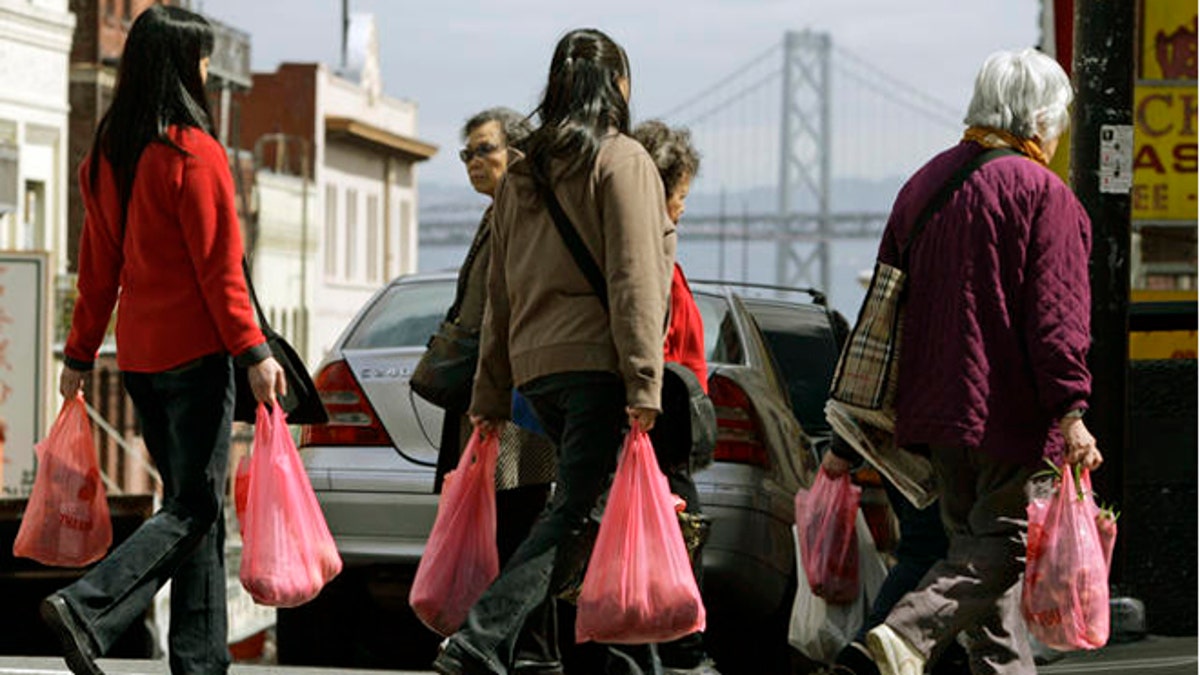
FILE: Women shoppers walk with plastic bags in the Chinatown district of San Francisco. (AP)
Until recently, I never considered myself to be a politically active individual.
I consider mine an American story, driven by little more than hard work and perseverance – lessons that were taught to me by my mother and father and that I’ve tried to instill in my three children. I studied Chemical Engineering, pursued a career in business and have run numerous companies throughout my life.
I’m proud to now be the Chairman and CEO of Hilex Poly, a manufacturer of plastic bags and films, but more importantly a pioneer in plastic bag and film recycling. We have driven innovation in recycling, creating and supporting thousands of jobs for hardworking people who are providing for their families. Never did I think I’d end up spending so much time defending them, their jobs, and their ability to support their families. However, these people work extremely hard, and I am proud to represent them.
[pullquote]
In the past few years, environmental activists have put our industry on their target list – unfairly using junk science and myths to promote their ideological agenda, without regard for thousands of American jobs and the livelihoods of so many families. They have spread mistruths that need to be corrected. American-made plastic bags are mainly produced from natural gas – NOT OIL! They are sanitary, safe and 100% reusable and recyclable.
Yet, plastic bags have been the target of legislators in pockets across America, where politicians have been working to ban or tax them – eliminating the jobs that they support – based on data or information which is incorrect. This means I spend less time working with my fellow co-workers innovating new manufacturing and recycling capabilities, and more time defending the jobs of men and women against politicians who are all too ready to unquestioningly accept junk science to push a nanny state agenda.
We have found ourselves defending our American jobs and our industry in several places across the nation, and thankfully have met some reasonable elected officials who want to legislate based on facts. But, all too often, it’s an uphill battle against ideology.
I have not once wavered in my conviction that it’s worthwhile. I’m fighting, not just to protect the jobs of more than 30,000 Americans employed by the plastic bag manufacturing and recycling sector, but to counter a policy that is bad for both the environment and for local economies.
Plastic bags make up only a fraction of a percent of the total litter stream, so banning them won’t have an impact on litter. However, I, like everyone else in America, don’t want litter and that is why I am so proud of the recycling process that my co-workers have developed. We are not only recycling bags, but other products like newspaper bags, shrink films and other products. Ironically, plastic bag litter actually increased in San Francisco in the year following its ban, according to the city’s own report.
Plastic bags leave less of a carbon footprint than paper – using less water and having drastically less transport costs. Cloth bags need to be used approximately 130 times before being a ‘greener’ option than plastic.
Some suggest using sewn Polypropylene bags, but these are generally imported from China, cannot be recycled, and are usually made from foreign oil. A number of these have been recalled due to lead content. The bags have also been proven to harbor dangerous bacteria like E. coli and coliform. Yet, some want to force unsuspecting parents to put their children’s food in these lead-filled bags.
Then there’s the economic impact of plastic bag bans, since forcing us to buy reusable bags only increases grocery costs. When people shop elsewhere to avoid bans, small businesses suffer the most.
Had you asked me twenty years ago, I never would have guessed that I’d find myself having to protect jobs instead of working each day to create them. However, I know that I and many others in this industry that have American manufacturing jobs at risk will not stop working to communicate the truth.
At a time of legislative gridlock across the US, my experience has convinced me that what we need as a country is for businesses and private citizens to speak up and bring the facts back to the center of conversation – especially when the alternative means killing American jobs. Let's focus on growing our American work force, not punishing it.








































